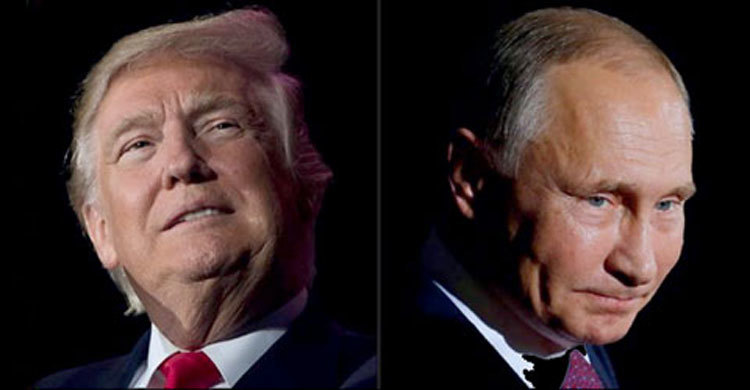US imposes sanctions on 19 Russians

The Trump administration has announced sanctions against 19 Russians - including an individual known as Vladimir Putin’s “chef” - for their alleged role in trying to interfere in the 2016 presidential election.
In the most significant response yet from the US to Russia’s alleged role in meddling in the election since Donald Trump became president, the US Treasury announced the names of the Russians whose assets were being frozen and whom Americans were prevented from doing business with.
Among the names were the 13 individuals indicted last month by Special Prosecutor Robert Mueller for “conspiracy to defraud the United States”. The US also accused Russia of being behind a cyber attack on the energy industry and other, similar sectors.
“The administration is confronting and countering malign Russian cyber activity, including their attempted interference in US elections, destructive cyber attacks, and intrusions targeting critical infrastructure,” Treasury Secretary Steve Mnuchin said in a statement.
The names of the 19 Russians were added to the Treasury’s Office of Foreign Assets Control’s list of specially designated individuals, or SDNs. It means their financial assets are blocked and that Americans are prohibited from doing business with them.
In the aftermath of the 2016 election, Barack Obama’s government accused Russia of trying to interfere in the election, to the benefit of Mr Trump. Mr Trump denied the suggestion, as did Russia, but Mr Obama went ahead and expelled 35 Russian diplomats accused of spying.
Russia did not respond at the time, apparently after conversations with former general Michael Flynn, the man who would briefly become Mr Trump’s national security adviser.
In this instance, Thursday’s sanctions, which came at the same time the Trump administration added its name to a collective statement with Britain, France and Germany on Thursday denouncing Russia for its apparent role in a nerve gas attack on a former Russian spy and his daughter in the UK, Russia vowed that it would respond in turn.
Russian Deputy Foreign Minister Sergei Ryabkov said Moscow was preparing retaliatory measures, Reuters cited the Interfax news agency as saying.
Mr Ryabkov said the Kremlin was responding calmly to the new sanctions and “taking this in our stride.” But he said Russia had “begun preparing retaliatory measures”.
He also suggested the Trump administration timed the sanctions to come ahead of this weekend's presidential election in Russia.
Among the 19 Russian individuals named in the latest round of sanction was Yevgeny Viktorovich Prigozhin, who has been nicknamed “Putin’s chef”, because of his close relationship with the Russian president. Mr Prigozhin was among the 13 individuals indicted by Mr Mueller in February.
In addition to the 19 individuals, the sanctions listed five organisations and groups, including the Internet Research Agency, a so-called “troll farm” based in St Petersburg, and which Mr Progozhin allegedly controlled.
The new sanctions also include Russian intelligence services, the Federal Security Service (FSB) and Main Intelligence Directorate (GRU), and six individuals working on behalf of the GRU.
Meanwhile, the Department of Homeland Security Department claimed the Russian government was behind a hacking operation has affected the US’s nuclear, aviation, water, construction and manufacturing sectors.
The Associated Press said the Computer Emergency Readiness Team said the operation targeted smaller American commercial facilities. The operation is said to have resorted to various methods, to try to compromise legitimate user accounts, gather user credentials, and target industrial control systems and their networks.
A US government alert to industry said the hackers deleted activity logs to try to cover their tracks. The alert said the hackers also used created administrator accounts on local machines that were disguised to appear legitimate. The NotPetya attack that cost billions of dollars in damage across Europe, Asia and the United States.
Source: Agencies



